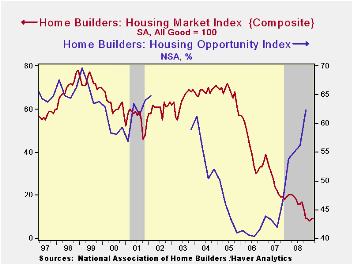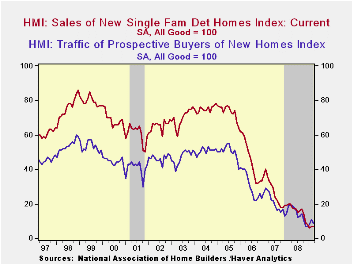 Global| Mar 16 2009
Global| Mar 16 2009U.S. Home Builders' Index Still Under Extreme Pressure
by:Tom Moeller
|in:Economy in Brief
Summary
Still under extreme pressure, the March Housing Market Index (HMI) from the National Association of Home Builders remained stable month-to-month at 9. During four of the last five months the index level of 9 was barley above the [...]

Still under extreme pressure, the March Housing Market Index (HMI) from the National Association of Home Builders remained stable month-to-month at 9. During four of the last five months the index level of 9 was barley above the record low of 8 touched during January. The index is compiled from survey questions asking builders to rate market conditions as “good”, “fair”, “poor” or “very high” to “very low”. Numerical results over 50 indicate a predominance of “good” readings.
The Home Builders Association indicated that its sub-index of present sales remained at a reading of 7, up just slightly from the record low touched during January. The latest figure remained well below last year's average level of 16, 2007's average of 27, 2006's average of 45 and 2005's average of 73.Since 1990, the year-to-year change in this index has had an 80% correlation with the year-to-year percentage change in new single-family home sales.
The index of builders’ expectations for home sales in six
months remained at its record low. In addition, the
“traffic" of prospective buyers fell back and reversed most of the
February uptick. The index remained near the record low.
Index readings in each of the country's regions remained near the record low.
Not only are builders disturbed by the market for new homes, but in the fourth quarter the assessment of conditions for remodeling a home reached a record low. The conditions for major and minor alterations fell sharply. Expectations also fell to a record low. Emphasizing that weakness was that the backlog of remodeling jobs fell to one third the peak reached during 2005.
During the fourth quarter the Home Builders' Housing Opportunity Index, which is the share of homes sold that could be considered affordable to a family earning the median income, rose even higher to its highest level since early 2002. It was up by nearly one half from the 2006 low due to lower home prices, lower interest rates and higher income. (There is a break in the series from 2002 to 2003.)
The NAHB has compiled the Housing Market Index since 1985. The weights assigned to the individual index components are .5920 for single family detached sales, present time; .1358 for single family detached sales, next six months; and .2722 for traffic of prospective buyers. The results, along with other housing and remodeling indexes from NAHB Economics, are included in Haver’s SURVEYS database.
Relief for Responsible Homeowners One Step Closer Under New Treasury Guidelines is available here.
| Nat'l Association of Home Builders | March | February | March '08 | 2008 | 2007 | 2006 |
|---|---|---|---|---|---|---|
| Composite Housing Market Index (All Good = 100) | 9 | 9 | 20 | 16 | 27 | 42 |
| Single-Family Sales | 7 | 7 | 20 | 16 | 27 | 45 |
| Single-Family Sales: Next Six Months | 15 | 15 | 26 | 25 | 37 | 51 |
| Traffic of Prospective Buyers | 9 | 11 | 19 | 14 | 21 | 30 |
Tom Moeller
AuthorMore in Author Profile »Prior to joining Haver Analytics in 2000, Mr. Moeller worked as the Economist at Chancellor Capital Management from 1985 to 1999. There, he developed comprehensive economic forecasts and interpreted economic data for equity and fixed income portfolio managers. Also at Chancellor, Mr. Moeller worked as an equity analyst and was responsible for researching and rating companies in the economically sensitive automobile and housing industries for investment in Chancellor’s equity portfolio. Prior to joining Chancellor, Mr. Moeller was an Economist at Citibank from 1979 to 1984. He also analyzed pricing behavior in the metals industry for the Council on Wage and Price Stability in Washington, D.C. In 1999, Mr. Moeller received the award for most accurate forecast from the Forecasters' Club of New York. From 1990 to 1992 he was President of the New York Association for Business Economists. Mr. Moeller earned an M.B.A. in Finance from Fordham University, where he graduated in 1987. He holds a Bachelor of Arts in Economics from George Washington University.






